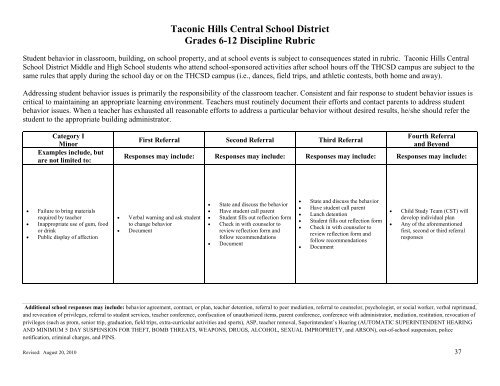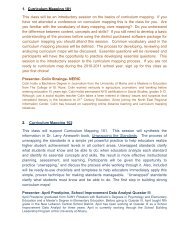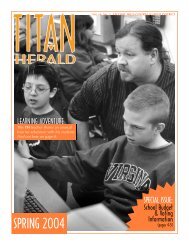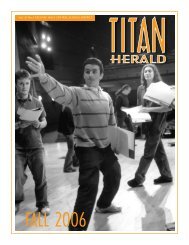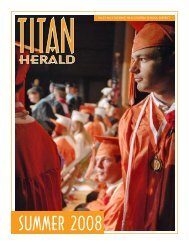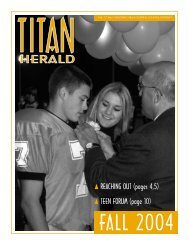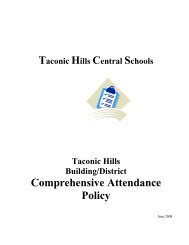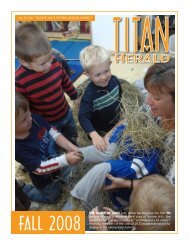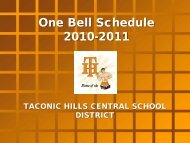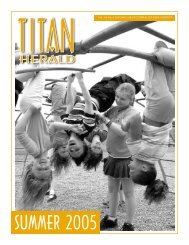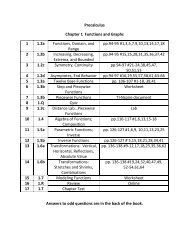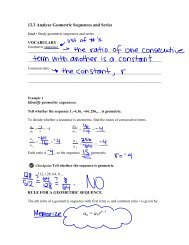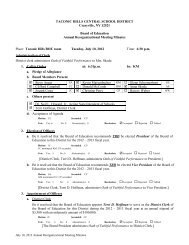Taconic Hills Central School District Grades 6-12 Discipline Rubric
Taconic Hills Central School District Grades 6-12 Discipline Rubric
Taconic Hills Central School District Grades 6-12 Discipline Rubric
Create successful ePaper yourself
Turn your PDF publications into a flip-book with our unique Google optimized e-Paper software.
<strong>Taconic</strong> <strong>Hills</strong> <strong>Central</strong> <strong>School</strong> <strong>District</strong><strong>Grades</strong> 6-<strong>12</strong> <strong>Discipline</strong> <strong>Rubric</strong>Student behavior in classroom, building, on school property, and at school events is subject to consequences stated in rubric. <strong>Taconic</strong> <strong>Hills</strong> <strong>Central</strong><strong>School</strong> <strong>District</strong> Middle and High <strong>School</strong> students who attend school-sponsored activities after school hours off the THCSD campus are subject to thesame rules that apply during the school day or on the THCSD campus (i.e., dances, field trips, and athletic contests, both home and away).Addressing student behavior issues is primarily the responsibility of the classroom teacher. Consistent and fair response to student behavior issues iscritical to maintaining an appropriate learning environment. Teachers must routinely document their efforts and contact parents to address studentbehavior issues. When a teacher has exhausted all reasonable efforts to address a particular behavior without desired results, he/she should refer thestudent to the appropriate building administrator.Category IMinorExamples include, butare not limited to:First Referral Second Referral Third ReferralFourth Referraland BeyondResponses may include: Responses may include: Responses may include: Responses may include:• Failure to bring materialsrequired by teacher• Inappropriate use of gum, foodor drink• Public display of affection• Verbal warning and ask studentto change behavior• Document• State and discuss the behavior• Have student call parent• Student fills out reflection form• Check in with counselor toreview reflection form andfollow recommendations• Document• State and discuss the behavior• Have student call parent• Lunch detention• Student fills out reflection form• Check in with counselor toreview reflection form andfollow recommendations• Document• Child Study Team (CST) willdevelop individual plan• Any of the aforementionedfirst, second or third referralresponsesAdditional school responses may include: behavior agreement, contract, or plan, teacher detention, referral to peer mediation, referral to counselor, psychologist, or social worker, verbal reprimand,and revocation of privileges, referral to student services, teacher conference, confiscation of unauthorized items, parent conference, conference with administrator, mediation, restitution, revocation ofprivileges (such as prom, senior trip, graduation, field trips, extra-curricular activities and sports), ASP, teacher removal, Superintendent’s Hearing (AUTOMATIC SUPERINTENDENT HEARINGAND MINIMUM 5 DAY SUSPENSION FOR THEFT, BOMB THREATS, WEAPONS, DRUGS, ALCOHOL, SEXUAL IMPROPRIETY, and ARSON), out-of-school suspension, policenotification, criminal charges, and PINS.Revised: August 20, 2010 37
<strong>Taconic</strong> <strong>Hills</strong> <strong>Central</strong> <strong>School</strong> <strong>District</strong><strong>Grades</strong> 6-<strong>12</strong> <strong>Discipline</strong> <strong>Rubric</strong>Student behavior in classroom, building, on school property, and at school events is subject to consequences stated in rubric. <strong>Taconic</strong> <strong>Hills</strong> <strong>Central</strong><strong>School</strong> <strong>District</strong> Middle and High <strong>School</strong> students who attend school-sponsored activities after school hours off the THCSD campus are subject to thesame rules that apply during the school day or on the THCSD campus (i.e., dances, field trips, and athletic contests, both home and away).Addressing student behavior issues is primarily the responsibility of the classroom teacher. Consistent and fair response to student behavior issues iscritical to maintaining an appropriate learning environment. Teachers must routinely document their efforts and contact parents to address studentbehavior issues. When a teacher has exhausted all reasonable efforts to address a particular behavior without desired results, he/she should refer thestudent to the appropriate building administrator.Category IIInterfering with OwnEducationExamples include, butare not limited to:• Sleeping• Academic insubordination• Inappropriate language• Cheating• Plagiarism• Interruption of the teachingprocesso Off tasko Interrupting teachero Out of seato Disrupting other students• Tardy to <strong>School</strong>/class• Truancy/ excessive absences• Lying to school personnel• Skipping detentionFirst Referral Second Referral Third ReferralFourth Referraland BeyondResponses may include: Responses may include: Responses may include: Responses may include:• State and discuss the behavior• Have student call parent• Lunch detention/ after schooldetention• Student fills out reflection form• Check in with counselor toreview reflection form andfollow recommendations• Document• State and discuss the behavior• Have student call parent• Lunch detentions/ after schooldetentions• Student fills out reflection form• Check in with counselor toreview reflection form andfollow recommendations• Document• State and discuss the behavior• Have student call parent• Alternative <strong>School</strong> Placement(ASP)• Student fills out reflection form• Check in with counselor toreview reflection form andfollow recommendations• Document• Child Study Team (CST) willdevelop individual plan• Any of the aforementionedfirst, second or third referralresponsesAdditional school responses may include: behavior agreement, contract, or plan, teacher detention, referral to peer mediation, referral to counselor, psychologist, or social worker, verbal reprimand,and revocation of privileges, referral to student services, teacher conference, confiscation of unauthorized items, parent conference, conference with administrator, mediation, restitution, revocation ofprivileges (such as prom, senior trip, graduation, field trips, extra-curricular activities and sports), ASP, teacher removal, Superintendent’s Hearing (AUTOMATIC SUPERINTENDENT HEARINGAND MINIMUM 5 DAY SUSPENSION FOR THEFT, BOMB THREATS, WEAPONS, DRUGS, ALCOHOL, SEXUAL IMPROPRIETY, and ARSON), out-of-school suspension, policenotification, criminal charges, and PINS.Revised: August 20, 2010 38
<strong>Taconic</strong> <strong>Hills</strong> <strong>Central</strong> <strong>School</strong> <strong>District</strong><strong>Grades</strong> 6-<strong>12</strong> <strong>Discipline</strong> <strong>Rubric</strong>Student behavior in classroom, building, on school property, and at school events is subject to consequences stated in rubric. <strong>Taconic</strong> <strong>Hills</strong> <strong>Central</strong><strong>School</strong> <strong>District</strong> Middle and High <strong>School</strong> students who attend school-sponsored activities after school hours off the THCSD campus are subject to thesame rules that apply during the school day or on the THCSD campus (i.e., dances, field trips, and athletic contests, both home and away).Addressing student behavior issues is primarily the responsibility of the classroom teacher. Consistent and fair response to student behavior issues iscritical to maintaining an appropriate learning environment. Teachers must routinely document their efforts and contact parents to address studentbehavior issues. When a teacher has exhausted all reasonable efforts to address a particular behavior without desired results, he/she should refer thestudent to the appropriate building administrator.Category IIIInterfering with Educationof OthersExamples include, but arenot limited to:First Referral Second Referral Third ReferralFourth Referraland BeyondResponses may include: Responses may include: Responses may include: Responses may include:LEVEL 1• Dress Codeo Dress code to includeitems addressed in studenthandbook plus hats, andelectronic devices• Ask student to comply withschool rule. If they complystudent is given a verbalwarning. If they do notcomply, student will call parentand be sent home. A parentconference will be requiredbefore student can return.• State and discuss the behavior• Have student call parent• Alternative <strong>School</strong> Placement(ASP)• Student fills out reflection form• Check in with counselor toreview reflection form andfollow recommendations• Document• If student does not comply,student will call parent and besent home. Upon return, thestudent will then be required tofollow the ASP protocol listedabove.• State and discuss the behavior• Have student call parent• Alternative <strong>School</strong> Placement(ASP)• Student fills out reflection form• Check in with counselor toreview reflection form andfollow recommendations• Document• If student does not comply,student will call parent and besent home. Upon return, thestudent will then be required tofollow the ASP protocol listedabove.• Child Study Team (CST) willdevelop individual plan• Any of the aforementionedfirst, second or third referralresponsesAdditional school responses may include: behavior agreement, contract, or plan, teacher detention, referral to peer mediation, referral to counselor, psychologist, or social worker, verbal reprimand,and revocation of privileges, referral to student services, teacher conference, confiscation of unauthorized items, parent conference, conference with administrator, mediation, restitution, revocation ofprivileges (such as prom, senior trip, graduation, field trips, extra-curricular activities and sports), ASP, teacher removal, Superintendent’s Hearing (AUTOMATIC SUPERINTENDENT HEARINGAND MINIMUM 5 DAY SUSPENSION FOR THEFT, BOMB THREATS, WEAPONS, DRUGS, ALCOHOL, SEXUAL IMPROPRIETY, and ARSON), out-of-school suspension, policenotification, criminal charges, and PINS.Revised: August 20, 2010 39
<strong>Taconic</strong> <strong>Hills</strong> <strong>Central</strong> <strong>School</strong> <strong>District</strong><strong>Grades</strong> 6-<strong>12</strong> <strong>Discipline</strong> <strong>Rubric</strong>Student behavior in classroom, building, on school property, and at school events is subject to consequences stated in rubric. <strong>Taconic</strong> <strong>Hills</strong> <strong>Central</strong><strong>School</strong> <strong>District</strong> Middle and High <strong>School</strong> students who attend school-sponsored activities after school hours off the THCSD campus are subject to thesame rules that apply during the school day or on the THCSD campus (i.e., dances, field trips, and athletic contests, both home and away).Addressing student behavior issues is primarily the responsibility of the classroom teacher. Consistent and fair response to student behavior issues iscritical to maintaining an appropriate learning environment. Teachers must routinely document their efforts and contact parents to address studentbehavior issues. When a teacher has exhausted all reasonable efforts to address a particular behavior without desired results, he/she should refer thestudent to the appropriate building administrator.Category IIIInterfering with Educationof OthersExamples include, but arenot limited to:LEVEL 2• Failure to respect others andtheir property• Failure to comply with a staffmember request• Failure to followclass/school/district rules andpolicies• Leaving class or campuswithout permission• Vulgar, disrespectful languagedirected at others, gestures orsymbols• Roughhousing• Misuse of computers ornetwork• Use/possession of obscene,dangerous, disruptive oroffensive materials• Exposure of private partsFirst Referral Second Referral Third ReferralFourth Referraland BeyondResponses may include: Responses may include: Responses may include: Responses may include:• State and discuss the behavior• Have student call parent• Alternative <strong>School</strong> Placement(ASP)• Student fills out reflection form• Check in with counselor toreview reflection form andfollow recommendations• Revocation of computerprivileges (if applicable tooffense)• Document• State and discuss the behavior• Have student call parent• Alternative <strong>School</strong> Placement(ASP)• Student fills out reflection form• Check in with counselor toreview reflection form andfollow recommendations• Revocation of computerprivileges (if applicable tooffense)• Document• State and discuss the behavior• Have student call parent and besent home (OSS)• Alternative <strong>School</strong> Placement(ASP)• Parent conference requiredbefore student can return• Student fills out reflection form• Check in with counselor toreview reflection form andfollow recommendations• Revocation of computerprivileges (if applicable tooffense)• Document• Child Study Team (CST) willdevelop individual plan• Any of the aforementionedfirst, second or third referralresponsesAdditional school responses may include: behavior agreement, contract, or plan, teacher detention, referral to peer mediation, referral to counselor, psychologist, or social worker, verbal reprimand,and revocation of privileges, referral to student services, teacher conference, confiscation of unauthorized items, parent conference, conference with administrator, mediation, restitution, revocation ofprivileges (such as prom, senior trip, graduation, field trips, extra-curricular activities and sports), ASP, teacher removal, Superintendent’s Hearing (AUTOMATIC SUPERINTENDENT HEARINGAND MINIMUM 5 DAY SUSPENSION FOR THEFT, BOMB THREATS, WEAPONS, DRUGS, ALCOHOL, SEXUAL IMPROPRIETY, and ARSON), out-of-school suspension, policenotification, criminal charges, and PINS.Revised: August 20, 2010 40
<strong>Taconic</strong> <strong>Hills</strong> <strong>Central</strong> <strong>School</strong> <strong>District</strong><strong>Grades</strong> 6-<strong>12</strong> <strong>Discipline</strong> <strong>Rubric</strong>Student behavior in classroom, building, on school property, and at school events is subject to consequences stated in rubric. <strong>Taconic</strong> <strong>Hills</strong> <strong>Central</strong><strong>School</strong> <strong>District</strong> Middle and High <strong>School</strong> students who attend school-sponsored activities after school hours off the THCSD campus are subject to thesame rules that apply during the school day or on the THCSD campus (i.e., dances, field trips, and athletic contests, both home and away).Addressing student behavior issues is primarily the responsibility of the classroom teacher. Consistent and fair response to student behavior issues iscritical to maintaining an appropriate learning environment. Teachers must routinely document their efforts and contact parents to address studentbehavior issues. When a teacher has exhausted all reasonable efforts to address a particular behavior without desired results, he/she should refer thestudent to the appropriate building administrator.Category IVBullyingExamples include, but arenot limited to:PhysicalFirst Referral Second Referral Third ReferralFourth Referraland BeyondResponses may include: Responses may include: Responses may include: Responses may include:• Hitting, kicking, pinching• Taking propertyVerbal• Name calling• Written• Teasing• Cyber• Insults• IntimidationIndirect• Cyber• Written• Exclusion• Nonverbal gestures• State and discuss the behavior• Have student call parent• Alternative <strong>School</strong> Placement(ASP)• Student fills out reflection form• Check in with counselor toreview reflection form andfollow recommendations• Document• State and discuss the behavior• Have student call parent• Alternative <strong>School</strong> Placement(ASP)• Student fills out reflection form• Check in with counselor toreview reflection form andfollow recommendations• Document• State and discuss the behavior• Have student call parent and besent home• Alternative <strong>School</strong> Placement(ASP)• Have student call parent andsent home (OSS)• Parent conference requiredbefore student can return• Student fills out reflection form• Check in with counselor toreview reflection form andfollow recommendations• Document• Child Study Team (CST) willdevelop individual plan• Any of the aforementionedfirst, second or third referralresponsesAdditional school responses may include: behavior agreement, contract, or plan, teacher detention, referral to peer mediation, referral to counselor, psychologist, or social worker, verbal reprimand,and revocation of privileges, referral to student services, teacher conference, confiscation of unauthorized items, parent conference, conference with administrator, mediation, restitution, revocation ofprivileges (such as prom, senior trip, graduation, field trips, extra-curricular activities and sports), ASP, teacher removal, Superintendent’s Hearing (AUTOMATIC SUPERINTENDENT HEARINGAND MINIMUM 5 DAY SUSPENSION FOR THEFT, BOMB THREATS, WEAPONS, DRUGS, ALCOHOL, SEXUAL IMPROPRIETY, and ARSON), out-of-school suspension, policenotification, criminal charges, and PINS.Revised: August 20, 2010 41
<strong>Taconic</strong> <strong>Hills</strong> <strong>Central</strong> <strong>School</strong> <strong>District</strong><strong>Grades</strong> 6-<strong>12</strong> <strong>Discipline</strong> <strong>Rubric</strong>Student behavior in classroom, building, on school property, and at school events is subject to consequences stated in rubric. <strong>Taconic</strong> <strong>Hills</strong> <strong>Central</strong><strong>School</strong> <strong>District</strong> Middle and High <strong>School</strong> students who attend school-sponsored activities after school hours off the THCSD campus are subject to thesame rules that apply during the school day or on the THCSD campus (i.e., dances, field trips, and athletic contests, both home and away).Addressing student behavior issues is primarily the responsibility of the classroom teacher. Consistent and fair response to student behavior issues iscritical to maintaining an appropriate learning environment. Teachers must routinely document their efforts and contact parents to address studentbehavior issues. When a teacher has exhausted all reasonable efforts to address a particular behavior without desired results, he/she should refer thestudent to the appropriate building administrator.Category IVBullying (continued)Examples include, but arenot limited to:First Referral Second Referral Third ReferralFourth Referraland BeyondResponses may include: Responses may include: Responses may include: Responses may include:Harassment/Discrimination based onactual or perceived:• Gender, Sex, Sexual Orientation• Religion or Religious Practice• Physical Characteristics, Color,Weight• Attire• Race, Ethnicity, National Origin• Disability• Rumor Spreading• Instigating or provoking analtercation• Hazing, including intentional orreckless acts directed at another forthe purpose of obtainingmembership on a team or club,district sponsored activity ororganization• State and discuss the behavior• Have student call parent• Alternative <strong>School</strong> Placement(ASP)• Student reflection form• Counseling• Document• Peer support groups; correctiveinstruction or other relevantlearning or service experience• modification of schedules• adjustment in hallway traffic andother student routes of travel(additional responses may apply)• State and discuss the behavior• Have student call parent• Alternative <strong>School</strong> Placement(ASP)• Student reflection form• Counseling• Document• Peer support groups; correctiveinstruction or other relevantlearning or service experience• modification of schedules• adjustment in hallway traffic andother student routes of travel(additional responses may apply)• State and discuss the behavior• Have student call parent and besent home (OSS)• Alternative <strong>School</strong> Placement(ASP)• Parent conference requiredbefore student can return• Student fills out reflection form• Check in with counselor toreview reflection form andfollow recommendations• Document(additional responses may apply)• Child Study Team (CST) willdevelop individual planAny of the aforementionedfirst, second or third referralresponses(additional responses may apply)Additional school responses may include: behavior agreement, contract, or plan, teacher detention, referral to peer mediation, referral to counselor, psychologist, or social worker, verbal reprimand,and revocation of privileges, referral to student services, teacher conference, confiscation of unauthorized items, parent conference, conference with administrator, mediation, restitution, revocation ofprivileges (such as prom, senior trip, graduation, field trips, extra-curricular activities and sports), ASP, teacher removal, Superintendent’s Hearing (AUTOMATIC SUPERINTENDENT HEARINGAND MINIMUM 5 DAY SUSPENSION FOR THEFT, BOMB THREATS, WEAPONS, DRUGS, ALCOHOL, SEXUAL IMPROPRIETY, and ARSON), out-of-school suspension, policenotification, criminal charges, and PINS.Revised: August 20, 2010 42
<strong>Taconic</strong> <strong>Hills</strong> <strong>Central</strong> <strong>School</strong> <strong>District</strong><strong>Grades</strong> 6-<strong>12</strong> <strong>Discipline</strong> <strong>Rubric</strong>Student behavior in classroom, building, on school property, and at school events is subject to consequences stated in rubric. <strong>Taconic</strong> <strong>Hills</strong> <strong>Central</strong><strong>School</strong> <strong>District</strong> Middle and High <strong>School</strong> students who attend school-sponsored activities after school hours off the THCSD campus are subject to thesame rules that apply during the school day or on the THCSD campus (i.e., dances, field trips, and athletic contests, both home and away).Addressing student behavior issues is primarily the responsibility of the classroom teacher. Consistent and fair response to student behavior issues iscritical to maintaining an appropriate learning environment. Teachers must routinely document their efforts and contact parents to address studentbehavior issues. When a teacher has exhausted all reasonable efforts to address a particular behavior without desired results, he/she should refer thestudent to the appropriate building administrator.Category VSubstance AbuseExamples include but arenot limited to:LEVEL 1• Tobacco or Tobaccoparaphernalia use orpossessionFirst Referral Second Referral Third ReferralFourth Referraland BeyondResponses may include: Responses may include: Responses may include: Responses may include:• Have student call parent• Alternative <strong>School</strong> Placement(ASP)• Student fills out reflection form• Check in with counselor toreview reflection form andfollow recommendations• Document• Have student call parent• Alternative <strong>School</strong> Placement(ASP)• Student has option tocomplete a 3-page researchpaper on this topic to reduceASP• Student fills out reflectionform• Check in with counselor toreview reflection form andfollow recommendations• Document• Have student call parent• Out of <strong>School</strong> Suspension (OSS)• Alternative <strong>School</strong> Placement(ASP)• Student has option to complete aPowerPoint presentation to anarranged group on this topic or aninterview with an approvedindividual and complete anapplicable summary to reduceASP/OSS• Student fills out reflection form• Check in with counselor to reviewreflection form and followrecommendations• Parent conference required forstudent to return to regular classes,review and/or complete reflectionform• Document• Child Study Team willdevelop individual plan• Any of the aforementioned first,second or third referralresponsesAdditional school responses may include: behavior agreement, contract, or plan, teacher detention, referral to peer mediation, referral to counselor, psychologist, or social worker, verbal reprimand,and revocation of privileges, referral to student services, teacher conference, confiscation of unauthorized items, parent conference, conference with administrator, mediation, restitution, revocation ofprivileges (such as prom, senior trip, graduation, field trips, extra-curricular activities and sports), ASP, teacher removal, Superintendent’s Hearing (AUTOMATIC SUPERINTENDENT HEARINGAND MINIMUM 5 DAY SUSPENSION FOR THEFT, BOMB THREATS, WEAPONS, DRUGS, ALCOHOL, SEXUAL IMPROPRIETY, and ARSON), out-of-school suspension, policenotification, criminal charges, and PINS.Revised: August 20, 2010 43
<strong>Taconic</strong> <strong>Hills</strong> <strong>Central</strong> <strong>School</strong> <strong>District</strong><strong>Grades</strong> 6-<strong>12</strong> <strong>Discipline</strong> <strong>Rubric</strong>Student behavior in classroom, building, on school property, and at school events is subject to consequences stated in rubric. <strong>Taconic</strong> <strong>Hills</strong> <strong>Central</strong><strong>School</strong> <strong>District</strong> Middle and High <strong>School</strong> students who attend school-sponsored activities after school hours off the THCSD campus are subject to thesame rules that apply during the school day or on the THCSD campus (i.e., dances, field trips, and athletic contests, both home and away).Addressing student behavior issues is primarily the responsibility of the classroom teacher. Consistent and fair response to student behavior issues iscritical to maintaining an appropriate learning environment. Teachers must routinely document their efforts and contact parents to address studentbehavior issues. When a teacher has exhausted all reasonable efforts to address a particular behavior without desired results, he/she should refer thestudent to the appropriate building administrator.Category VSubstance Abuse continuedExamples include but arenot limited to:LEVEL 2• Drug or Drug Paraphernalia Use orPossession• Alcohol Use or Possession• Chemical AbuseFirst Referral Second Referral Third ReferralFourth Referraland BeyondResponses may include: Responses may include: Responses may include: Responses may include:• Student has 24 hours to obtain drugtest• Refusing to drug test is considereda positive test• Out of <strong>School</strong> Suspension (OSS)• Student has option to completecertified drug/alcohol assessmentand follow all treatmentrecommendations to reducesuspension• Treatment compliance will bemonitored by school• Parent conference required forstudent to return to regular classes• Student has 24 hours to obtaindrug test• Refusing to drug test isconsidered a positive test• Out of <strong>School</strong> Suspension (OSS)• Student has option to completecertified drug/alcohol assessmentand follow all treatmentrecommendations to reducesuspension• Treatment compliance will bemonitored by school• Parent conference required forstudent to return to regular classes• Student has 24 hours to obtain drug test• Refusing to drug test is considered apositive test• Out of <strong>School</strong> Suspension (OSS)• Student has option to complete certifieddrug/alcohol assessment and follow alltreatment recommendations to reducesuspension• Treatment compliance will bemonitored by school• Parent conference required for studentto return to regular classes• Child Study Team will developindividual plan• Any of the aforementioned first,second or third referralresponsesAdditional school responses may include: behavior agreement, contract, or plan, teacher detention, referral to peer mediation, referral to counselor, psychologist, or social worker, verbal reprimand,and revocation of privileges, referral to student services, teacher conference, confiscation of unauthorized items, parent conference, conference with administrator, mediation, restitution, revocation ofprivileges (such as prom, senior trip, graduation, field trips, extra-curricular activities and sports), ASP, teacher removal, Superintendent’s Hearing (AUTOMATIC SUPERINTENDENT HEARINGAND MINIMUM 5 DAY SUSPENSION FOR THEFT, BOMB THREATS, WEAPONS, DRUGS, ALCOHOL, SEXUAL IMPROPRIETY, and ARSON), out-of-school suspension, policenotification, criminal charges, and PINS.Revised: August 20, 2010 44
<strong>Taconic</strong> <strong>Hills</strong> <strong>Central</strong> <strong>School</strong> <strong>District</strong><strong>Grades</strong> 6-<strong>12</strong> <strong>Discipline</strong> <strong>Rubric</strong>Student behavior in classroom, building, on school property, and at school events is subject to consequences stated in rubric. <strong>Taconic</strong> <strong>Hills</strong> <strong>Central</strong><strong>School</strong> <strong>District</strong> Middle and High <strong>School</strong> students who attend school-sponsored activities after school hours off the THCSD campus are subject to thesame rules that apply during the school day or on the THCSD campus (i.e., dances, field trips, and athletic contests, both home and away).Addressing student behavior issues is primarily the responsibility of the classroom teacher. Consistent and fair response to student behavior issues iscritical to maintaining an appropriate learning environment. Teachers must routinely document their efforts and contact parents to address studentbehavior issues. When a teacher has exhausted all reasonable efforts to address a particular behavior without desired results, he/she should refer thestudent to the appropriate building administrator.Category VIIllegalExamples include but arenot limited to:LEVEL 1• Driving Infractions• Gambling• Endangering the health and safetyof self and/or othersLEVEL 2• Theft/Possession of Stolen Goods• Forgery/Misrepresentation of aParent• Vandalism• TrespassingFirst Referral Second Referral Third ReferralFourth Referraland BeyondResponses may include: Responses may include: Responses may include: Responses may include:• State and discuss behavior• Have student call parent• Student receives warning• Document• State and discuss the behavior• Have student call parent• Alternative <strong>School</strong> Placement(ASP)• Student fills out reflection form• Check in with counselor to reviewreflection form and followrecommendations• Vandalism requires restitution• Document• State and discuss behavior• Have student call parent• Alternative <strong>School</strong> Placement (ASP)• Student fills out reflection form• Check in with counselor to reviewreflection form and followrecommendations• Document• State and discuss the behavior• Have student call parent• Out of <strong>School</strong> Suspension (OSS)• Alternative <strong>School</strong> Placement (ASP)• Student fills out reflection form• Parent conference required forstudent to return to regular classes,review and/or complete reflectionform• Check in with counselor to reviewreflection form and followrecommendations• Vandalism requires restitution• Document• State and discuss behavior• Have student call parent• Alternatives <strong>School</strong> Placement (ASP)• Student fills out reflection form• Check in with counselor to reviewreflection form and followrecommendations• Document• Out of <strong>School</strong> Suspension (OSS)• State and discuss the behavior• Have student call parent• Out of <strong>School</strong> Suspension (OSS)• Student fills out reflection form• Parent conference required for studentto return to regular classes, reviewand/or complete reflection form• Alternative <strong>School</strong> Placement (ASP)• Check in with counselor to reviewreflection form and followrecommendations• Vandalism requires restitution• Document• Child Study Team (CST) willdevelop individual plan• Any of the aforementioned first,second or third referral responses• Child Study Team (CST) willdevelop individual plan• Any of the aforementioned first,second or third referral responsesAdditional school responses may include: behavior agreement, contract, or plan, teacher detention, referral to peer mediation, referral to counselor, psychologist, or social worker, verbal reprimand,and revocation of privileges, referral to student services, teacher conference, confiscation of unauthorized items, parent conference, conference with administrator, mediation, restitution, revocation ofprivileges (such as prom, senior trip, graduation, field trips, extra-curricular activities and sports), ASP, teacher removal, Superintendent’s Hearing (AUTOMATIC SUPERINTENDENT HEARINGAND MINIMUM 5 DAY SUSPENSION FOR THEFT, BOMB THREATS, WEAPONS, DRUGS, ALCOHOL, SEXUAL IMPROPRIETY, and ARSON), out-of-school suspension, policenotification, criminal charges, and PINS.Revised: August 20, 2010 45
<strong>Taconic</strong> <strong>Hills</strong> <strong>Central</strong> <strong>School</strong> <strong>District</strong><strong>Grades</strong> 6-<strong>12</strong> <strong>Discipline</strong> <strong>Rubric</strong>Student behavior in classroom, building, on school property, and at school events is subject to consequences stated in rubric. <strong>Taconic</strong> <strong>Hills</strong> <strong>Central</strong><strong>School</strong> <strong>District</strong> Middle and High <strong>School</strong> students who attend school-sponsored activities after school hours off the THCSD campus are subject to thesame rules that apply during the school day or on the THCSD campus (i.e., dances, field trips, and athletic contests, both home and away).Addressing student behavior issues is primarily the responsibility of the classroom teacher. Consistent and fair response to student behavior issues iscritical to maintaining an appropriate learning environment. Teachers must routinely document their efforts and contact parents to address studentbehavior issues. When a teacher has exhausted all reasonable efforts to address a particular behavior without desired results, he/she should refer thestudent to the appropriate building administrator.Category VIIllegal continuedExamples include but arenot limited to:LEVEL 3• Fights/Threats/Intimidation againstStudents or Staff• Sexual HarassmentFirst Referral Second Referral Third ReferralFourth Referraland BeyondResponses may include: Responses may include: Responses may include: Responses may include:• State and discuss the behavior• Have student call parent• Out of <strong>School</strong> Suspension (OSS)• Alternative <strong>School</strong> Placement(ASP)• Student fills out reflection form• Parent conference required forstudent to return to regular classes,review and/or complete reflectionform• Check in with counselor to reviewreflection form and followrecommendations• Document• State and discuss the behavior• Have student call parent• Out of <strong>School</strong> Suspension (OSS)• Alternative <strong>School</strong> Placement(ASP)• Student fills out reflection form• Parent conference required forstudent to return to regular classes,review and/or complete reflectionform• Check in with counselor to reviewreflection form and followrecommendations• Document• State and discuss the behavior• Have student call parent• Out of <strong>School</strong> Suspension (OSS)• Student fills out reflection form• Parent conference required forstudent to return to regular classes,review and/or complete reflectionform• Check in with counselor to reviewreflection form and followrecommendations• Document• Child Study Team (CST) willdevelop individual plan• Any of the aforementioned first,second or third referral responsesAdditional school responses may include: behavior agreement, contract, or plan, teacher detention, referral to peer mediation, referral to counselor, psychologist, or social worker, verbal reprimand,and revocation of privileges, referral to student services, teacher conference, confiscation of unauthorized items, parent conference, conference with administrator, mediation, restitution, revocation ofprivileges (such as prom, senior trip, graduation, field trips, extra-curricular activities and sports), ASP, teacher removal, Superintendent’s Hearing (AUTOMATIC SUPERINTENDENT HEARINGAND MINIMUM 5 DAY SUSPENSION FOR THEFT, BOMB THREATS, WEAPONS, DRUGS, ALCOHOL, SEXUAL IMPROPRIETY, and ARSON), out-of-school suspension, policenotification, criminal charges, and PINS.Revised: August 20, 2010 46
<strong>Taconic</strong> <strong>Hills</strong> <strong>Central</strong> <strong>School</strong> <strong>District</strong><strong>Grades</strong> 6-<strong>12</strong> <strong>Discipline</strong> <strong>Rubric</strong>Student behavior in classroom, building, on school property, and at school events is subject to consequences stated in rubric. <strong>Taconic</strong> <strong>Hills</strong> <strong>Central</strong><strong>School</strong> <strong>District</strong> Middle and High <strong>School</strong> students who attend school-sponsored activities after school hours off the THCSD campus are subject to thesame rules that apply during the school day or on the THCSD campus (i.e., dances, field trips, and athletic contests, both home and away).Addressing student behavior issues is primarily the responsibility of the classroom teacher. Consistent and fair response to student behavior issues iscritical to maintaining an appropriate learning environment. Teachers must routinely document their efforts and contact parents to address studentbehavior issues. When a teacher has exhausted all reasonable efforts to address a particular behavior without desired results, he/she should refer thestudent to the appropriate building administrator.Category VIIllegal continuedExamples include but arenot limited to:First Referral Second Referral Third ReferralFourth Referraland BeyondResponses may include: Responses may include: Responses may include: Responses may include:LEVEL 4• Weapons• Other Criminal Acts• Assault• Sexual Assault• Sale/Intent to Distribute Drugs orAlcohol• Have student call parent• Out of <strong>School</strong> Suspension (OSS)• Superintendent’s Hearing todetermine length of suspension• Document• Have student call parent• Out of <strong>School</strong> Suspension (OSS)• Superintendent’s Hearing todetermine length of suspension• Document• Have student call parent• Out of <strong>School</strong> Suspension (OSS)• Superintendent’s Hearing todetermine length of suspension• Document• Child Study Team (CST) willdevelop individual planLEVEL 5• Firearm Possession• Mandated NYS one calendar yearsuspensionN/A N/A N/AAdditional school responses may include: behavior agreement, contract, or plan, teacher detention, referral to peer mediation, referral to counselor, psychologist, or social worker, verbal reprimand,and revocation of privileges, referral to student services, teacher conference, confiscation of unauthorized items, parent conference, conference with administrator, mediation, restitution, revocation ofprivileges (such as prom, senior trip, graduation, field trips, extra-curricular activities and sports), ASP, teacher removal, Superintendent’s Hearing (AUTOMATIC SUPERINTENDENT HEARINGAND MINIMUM 5 DAY SUSPENSION FOR THEFT, BOMB THREATS, WEAPONS, DRUGS, ALCOHOL, SEXUAL IMPROPRIETY, and ARSON), out-of-school suspension, policenotification, criminal charges, and PINS.Revised: August 20, 2010 47


